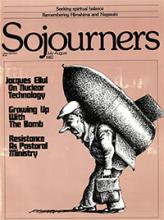I recently heard a retired British diplomat tell of a cable he sent years ago to a colleague at the United Nations who was embroiled in sensitive negotiations over Cyprus. The telegram said simply, "Let us have not a victory, but a success." The British army now has its victory in the Falkland (or Malvinas) Islands. But the whole venture can hardly be considered a success for anyone, least of all the hundreds of dead on both sides. As is usually the case in warfare, there are only losses and failures, the loss of lives and the failure of compassion and patience.
The aftermath of the war will certainly see life worsened for all involved. The British will probably have to keep a long-term military presence on the islands if they intend to insist on sovereignty indefinitely. Such an occupation will be costly both financially and politically. Argentina will probably deal with defeat by buying more weapons, becoming more belligerent, and possibly going ahead with development of its own atomic bomb. Other Latin American nations will step up military spending as well after seeing how easily the British defeated Argentina. The only winners will be the U.S. and Western European companies that make and sell missiles, bombers, and battleships.
Each war brings with it the hope that the world will learn a lesson from the folly and destruction. The lessons of the Falkland/Malvinas war are rather simple and familiar ones, but they bear pointing out again. First of all we are reminded that wars are often waged to divert attention from oppressive social and economic conditions. This seemed to be the intention in Argentina, where in the days before the occupation of the island, the military government was near collapse because of a failing economy and human rights protests.
Read the Full Article

